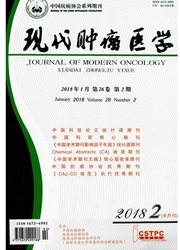

 中文摘要:
中文摘要:
EGFR-TKIs在EGFR突变型非小细胞肺癌治疗中是非常有效的。然而在非小细胞肺癌EGFR突变患者中约有20%天然耐药,即使治疗有效,在10-16月左右会产生继发耐药。迄今为止,研究发现可能的继发性耐药机制包括EGFR二次突变、旁路激活、下游信号激活、小细胞转化及上皮-间质转化(EMT)等。近期,有研究发现BIM基因与TKI耐药相关。本文就有关耐药机制的近期研究进展作一综述。
 英文摘要:
英文摘要:
Epidermal growth factor receptor( EGFR) tyrosine kinase inhibitors( EGFR- TKIs) are highly effective against non- small cell lung cancers( NSCLC) with EGFR activating mutations. However,in about 20% of cases,there is intrinsic resistance,even if the treatment is effective,resistance is acquired in about 10 to 16 months. Possible mechanisms of acquired resistance to EGFR- TKI,thus far,include a gate keeper mutation of EGFR,activation of an alternate pathway,activation of EGFR downstream signals,transformation to small cell lung cancer,and epithelial-mesenchym altransition( EMT). Recently,BIM( BCL2L11),which is a BH3- only proapoptotic member of the Bcl- 2 protein family,was shown to play a central role in inducing apoptosis in intrinsic resistance to EGFR- TKI treatment in EGFR mutant lung cancer cells. The review summarized the recent research progress of it.
 同期刊论文项目
同期刊论文项目
 同项目期刊论文
同项目期刊论文
 期刊信息
期刊信息
